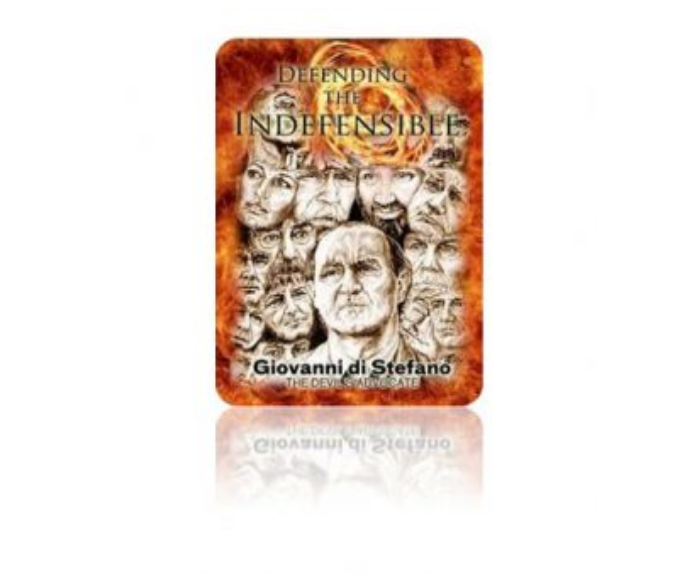
It was George Bernard Shaw that wrote the play ‘The Doctors Dilemma’ and A J Cronin the much-read novel The Citadel. They both dealt with the theme involving professional men and the rights of those under their care. Moving to legal themes John Grisham has kept us all amused and intrigued with the likes of The Client, The Pelican Brief, and The Chamber. Again, the theme is one of the professional man and the rights of disclosure regarding those under their mandate.
Would I have defended Jesus Christ? If I had the fall of Christianity would have been different!
At all times one needs a lawyer and one that has his eye very much on the ball! But what of those that have never had the chance of having a lawyer per se? What dilemma does the lawyer face who has to defend a guilty person? What dilemma does a lawyer face when he has to defend an innocent man found guilty? Worse what type of society do we live in, have we lived in where lawyers are not even provided?
What I am about to state may now shock more than one-third of the world’s reading population. Is it always wise to have a lawyer present? I have recently been asked by a number of newspapers if I had my choice who I would like to have defended.
I am proud to have defended H.E. President Saddam Hussein and proud to have assisted with the defence of H.E. President Milosevic. I have been proud to have represented a number if not all my clients and remain so.

However, as a matter of historical interest, I would have been more so honoured to have defended Jesus Christ. Yes, I have said I would have defended Satan and a ‘whole heap’ of other characters, but all in all I would have been honoured to have defended Jesus Christ, save, for one small factor!
Had I succeeded as undoubtedly so; I am not so certain that today Christianity would be present within our society.
Let us now look a little into the story and drama of Jesus Christ on the basis and of course subject to all the usual caveats.
Here is the classic tale told:
It was a Thursday evening in early spring. Thirteen men gathered for a Passover supper in an upper room. Pockets of light from oil lamps shone down on the long table where the men sat. This day would become the most fateful Thursday in all of human history.
As was the custom at Passover, each man had drunk four glasses of wine. Some of the men, unused to such large quantities, were a bit drunk. Presiding over the supper was a young man of thirty. He was unaffected by the wine.

Suddenly, the conviviality of the scene shattered. “One of you who eats with me shall betray me”, said the leader. With this startling pronouncement, the tranquil scene became one of confusion, one voice talking over another, some angry, some bewildered, some with slightly slurred speech. Except for one, all of the men reacted with horror at the very idea. They could not believe what they had heard. “Is it I?” each of them asked. “It is one of the twelve”, the leader said. As the babble of voices abated, the leader sent Judas Iscariot away.
Following the Last Supper, these men, Jesus and his disciples, retired to the Garden of Gethsemane. The garden was a tranquil spot on the edge of the bustling city of Jerusalem, a city whose population swelled with crowds of worshipers observing Passover. Eyelids heavy with the wine they had drunk, the disciples fell asleep. While they slept, Jesus prayed, struggling with the knowledge that the inevitable was about to take place. Jesus finally aroused the sleeping disciples. He told the most loyal of them, Peter Simon, “that this day, even in this night, before the cock crows twice, thou shall deny me thrice”. There was a sense of impending doom, as well as sadness in what Jesus knew would come.
The quiet of the garden was suddenly broken with the sound of clanking swords and pounding feet. It was the arrival of soldiers of the high priest led by Judas Iscariot. By prior arrangement, Judas kissed Jesus to identify him. Jesus was not surprised. “Wouldst thou betray me with a kiss?” asked Jesus.
When the arresting officers asked if he was Jesus of Nazareth, he said, “I am he”. A disciple drew a sword and cut off the ear of one of the soldiers. For a moment, confusion reigned, swords were brandished, and a battle seemed about to begin. Jesus told his disciples to desist and healed the man whose ear had been cut off. An eerie quiet now enveloped the garden. The fierceness of the disciples evaporated. They were outnumbered, and their eyes were fearful. They fled. It was now late Thursday night. A few hours before, Jesus had been breaking bread with his disciples. Now, they were gone. The soldiers took Jesus to the Council of the High Priests in the Temple were Caiaphas, the high priest, questioned him. During the questioning, Caiaphas asked Jesus, “Are you the Messiah?” Jesus did not answer the question directly, but allowed his interrogators to conclude that he had said yes. He did not respond to other questions. His silence was infuriating.
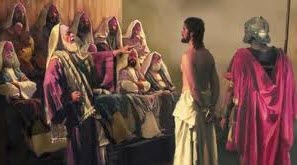
From the priests’ point of view, this troublesome rabbi had caused enough mischief for the Council of Priests. Had he not chased the moneychangers from the Temple? His heretic teachings must cease.
Witnesses were brought forth to testify that Jesus said that he would tear down the Temple and rebuild it in three days. This was the most blasphemous statement as the Temple was the holiest of structures in Jerusalem. The witnesses contradicted one another. They could not seem to get their stories straight. Jesus was silent throughout this proceeding. Angered to the point where he tore his clothes in frustration, Caiaphas pronounced Jesus a heretic, and, with the consent of his fellow priests, sentenced Jesus to death. All during this interrogation, the disciples were nowhere to be seen. Peter, at a safe distance, stood at the door outside the Temple chamber. “Then said the damsel that kept the door unto Peter, are you not one of this man’s disciples?” Peter, as Jesus had predicted, said, “I am not”.
The next morning, Friday, the Council of High Priests met again. It had been a long night, but the high priests had hardened in their determination to rid themselves of this threat to their power. They decided to transport Jesus to the Roman governor, Pontius Pilate. They had to do this because they needed a death sentence pronounced by the Roman governor. Jews were not allowed to carry out capital punishment. Fortunately, thought the Jews, Pilate had no reluctance to use his power.
Having faced his prosecutors, Jesus now faced his judge. Pilate examined Jesus. At first, Jesus seemed little different from many other self-proclaimed messiahs that he had examined over the years.
Most of these messiahs were whipped and sent on their way, temporary irritants to his administration of this Roman province. He asked Jesus if he was the King of the Jews, and Jesus neither admitted nor denied it, saying simply, “You say that I am”. This man puzzled Pilate. He was a bit different from the others. He had heard of Jesus and his teachings, and now he confronted this strange man. Pilate told the noisy, assembled throng that he could not find fault with Jesus.
The crowd was adamant. There was the smell of blood in the air. They called for Jesus’ crucifixion, the terrible method of execution for traitors used by the Romans. Pilate reminded the multitude that he could release a prisoner of their choice since it was Passover, and such commutations were the custom. Pilate did not get the answer he expected. The crowd called for the release of Barabbas; a prisoner who had been charged with murder during an insurrection.
Still not convinced that Jesus must die, Pilate had him taken away and whipped. He hoped that would satisfy the crowd. Even yet reluctant to sentence Jesus to death, Pilate again proposed that Jesus be released. He presented a beaten but erect and proud Jesus to the crowd, but they continued to call for his crucifixion. “Crucify him, crucify him!” they shouted. Pilate was faced with an unruly mob a threat to the good order of Roman rule. Bowing to the pressure of the crowd, and eager to keep the peace, he reluctantly sent Jesus off to be executed, telling the Jews that he washed his hands of the entire matter. The Jews, in their enthusiasm to kill this Nazarene heretic, took the responsibility for what was about to occur. It was of little consequence to them that they would be blamed for the death of this threat to their religious authority.
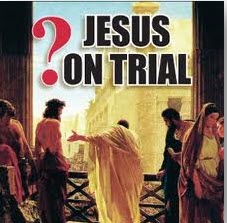
Jesus was crucified on that Friday. After three hours on the cross, Jesus died. The ‘King of the Jews’ was no more. Saturday passed without event. On Sunday, Jesus rose from the dead. It was Resurrection Sunday; Easter.
One story has ended. Another, lasting to this day, has begun.
That is the classic tale. It is also, of course, true that as one story ended, another, the one of Christianity has lasted over 2000 years and it would appear will remain so.
Let us now look carefully what would have happened if Jesus Christ had received legal counsel and had been given the right to a lawyer.
The following chart recounts in the clearest of terms how many trials Jesus Christ was, in effect, subject to and the relevant judicial authority together with the time of the trials and the biblical authorities.
The accusations are there as well as the legal basis, jurisdiction and of course the result. It is evidently clear that with a lawyer representing Jesus Christ the trial would have been stayed, the examination of witnesses would have proved that the statements made and taken were false and that as a matter of law any trial held on the Passover (which remains so to this day) would be a nullity!
In short, Jesus Christ would have been acquitted, perhaps with costs and restored to the Crowd and his Kingdom!
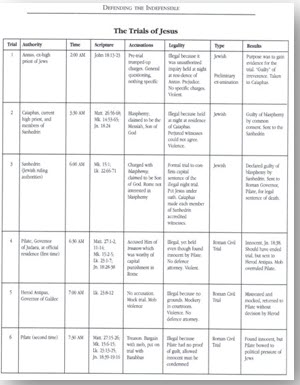
However, for Christianity to have existed, never mind continued, and for the Scriptures to have been true it was, in fact, necessary for Jesus Christ to be convicted and crucified, and then to be resurrected, otherwise, it would all be for nothing and he would just have been another Prophet from another time in a far-away place.
A lawyer would have done more harm than good in this case. However, in a democratic society, and certainly for the past 70 years, it has been a pre-requisite for legal counsel to be called upon, and in the past 50 years the law of the world, it would appear. Some Countries, however, behave as the Jews behaved way back when and have an idea, target criminals and whatever is said by defence lawyers’ convictions must occur.
The presence of defence lawyers is purely cosmetic.
Are those countries in the Middle East? Are they in Africa? No! Actually, by far closer to home. The worst offender is, yes you have guessed: – The United Kingdom and those who administer justice and are empowered to protect the rights of the accused namely the Court of Appeal are in fact as bad as those that tried Jesus Christ. Except that there remains the masquerade of hypocrisy in that defence lawyers are permitted to make representations but with judgements already drafted in advance of any hearing, it is merely a theatre.
The accused who are subjected to this cannot claim any prizes or any connection with Jesus Christ save that they are innocent. There are, of course, those that are indeed guilty. But that is irrelevant. Once the State makes a target it does not let go ever!
Jonathan King was but one. Paul Bush another, and Kenneth Noye, yet another still. Omar Benguit is also on the list and still waiting for justice. The Cohen brothers too languish in HMP Whitemoor and, of course, Jeremy Bamber. Nicholas Van Hoogstraten was the one that got away. John Gilligan is top of the list in Ireland closely followed by a host of others and some slip the net-like Assange-for now.
The Trials of Jesus
The lawyer’s dilemma is thus considerably disturbed. There is not a day that went past that I did not curse the day I had to walk into a Court Room, a place of reverence that once inspired me and many others, that justice prevailed, whereas, become a supermarket of a far-away ideal called justice. Being in oak surrounded panelled rooms facing old and blinkered men in wigs who are and will remain just gatekeepers made me wonder what it was all about?
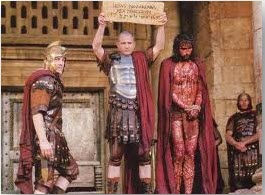
Maybe it is best if, as in the case of Jesus Christ, no lawyers are present when trying those accused. They are, after all, becoming superfluous and surplus to requirement. Every day I loathed more than ever the injustice of it all. It was this that led me to the decision at the beginning of this year to walk away from the law. There is no law just judicial opportunism.
Today, there are no more prophets as Jesus Christ. Was it right that he had no defence counsel? Certainly, if counsel had been present, he would have lived but what would have become of the world who knows.
Jesus Christ, however, died to bring, restore, and maintain, justice.
His sacrifice was for the whole world. I only hope that those who behave as Annas and Caiaphas that today sit in judgement on others learn a lesson and restore the profession to one of pride, instead of what is inevitably becoming nothing but a staged farce.
GDS
Excerpt from ‘Defending the Indefensible’ by Giovanni Di Stefano to be republished soon!!!!
Copyright © gdistefefano/cabayford 2020
NB: Some images retrieved from Google, will remove at owner’s request.
